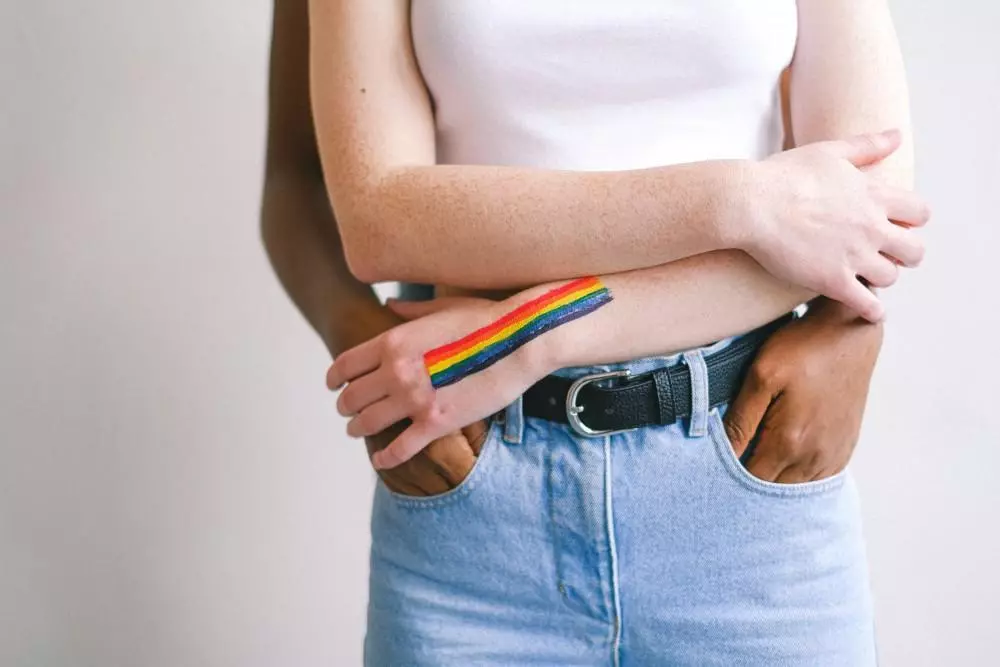In this Post
- Chronic Stress Related to Stigma
- Addressing Stigma Related Chronic Stress
- Chronic Stress Related to Harassment
- Addressing Harassment Related Chronic Stress
- Substance Abuse
- Avesta Ketamine and Wellness
Within the vibrant tapestry of humanity, the LGBTQ+ community has long stood as a beacon of diversity, resilience, and courage. Yet, beneath the vibrant colors and stories of triumph lie the untold narratives of mental health challenges faced by many LGBTQ+ individuals.
Recognizing the mental health challenges experienced by the LGBTQ+ community is crucial, not just limited to Pride Month but extending throughout the entire year.
From the shadowed corners of societal stigma to the intricate complexities of self-acceptance, this Pride Month, we aim to shine a light on the unique mental health struggles endured by members of the LGBTQ+ community. In doing so, we hope to deepen our understanding, foster empathy, and champion understanding of the landscape where mental health intersects with the vibrant lives of LGBTQ+ individuals, igniting a long overdue conversation.
Chronic Stress Related to Stigma
Discrimination and stigma are formidable challenges that members of the LGBTQ+ community frequently encounter throughout their lives. In various aspects of society, such as the workplace, housing sector, and healthcare system, they often face unfair treatment, prejudice, and exclusion¹. These experiences contribute to barriers to their personal and professional development but also take a toll on their mental health.
The constant strain of discrimination can result in chronic stress and heightened anxiety². The pervasive fear of being judged, rejected, or mistreated due to their sexual orientation or gender identity adds an immense burden to the lives of LGBTQ+ individuals. The constant vigilance required to navigate discriminatory environments can lead to a state of hyper-awareness and hypervigilance, contributing to chronic stress and anxiety disorders.
Furthermore, the cumulative impact of societal rejection and exclusion can profoundly affect the mental well-being of LGBTQ+ individuals. The profound sense of social isolation they may experience due to being marginalized and misunderstood can leave them feeling disconnected and without a sense of belonging³. The lack of acceptance and understanding can exacerbate feelings of loneliness, depression, and low self-esteem³.
Addressing Stigma Related Chronic Stress
Addressing discrimination and dismantling the barriers that perpetuate stigma are essential steps toward creating a more inclusive and accepting society. By promoting equality, fostering empathy, and raising awareness about the challenges faced by LGBTQ+ individuals, we can create environments that embrace diversity and safeguard the mental well-being of all individuals, regardless of their sexual orientation or gender identity. It is vital to strive for a world where LGBTQ+ individuals can live authentically, free from discrimination, and experience a sense of belonging and acceptance in all aspects of their lives.
Chronic Stress Related to Harassment
Bullying and harassment inflict significant harm on the mental health and well-being of LGBTQ+ individuals, particularly among young people who are navigating their identities and finding their place in the world. Due to their sexual orientation or gender identity, they face a heightened risk of being targeted for bullying, verbal abuse, violence, and social exclusion⁴.
The targeted mistreatment LGBTQ+ individuals endure due to their sexual orientation or gender identity can lead to enduring psychological trauma. The constant fear of being ridiculed, isolated, or physically harmed creates a hostile environment that further contributes to negative mental well-being. The effects of such harassment can manifest in various ways, including the development of post-traumatic stress disorder (PTSD), anxiety, depression, and suicidal ideation⁵.

Addressing Harassment Related Chronic Stress
Addressing the issue of bullying and harassment is crucial for creating a safer and more inclusive society for members of the LGBTQ+ community. By raising awareness, implementing comprehensive anti-bullying policies, and fostering a culture of respect and acceptance, we can mitigate the detrimental effects of bullying and harassment on their mental health. It is vital to provide resources, support networks, and LGBTQ+-inclusive education that empower individuals to stand up against discrimination and cultivate environments where everyone can thrive without fear of persecution or mistreatment.
One such environment has been developed by The Trevor Project, an organization that prioritizes safe spaces through sharing resources and garnering support for LGBTQ+ individuals.
GLAAD is an organization that champions fair and inclusive representation to inspire acceptance for members of the LGBTQ+ community. In addition to being a resource themselves, they also generate a list of resources for individuals seeking support for a wide range of topics.
Substance Abuse
Substance abuse can become a concerning coping mechanism for some members of the LGBTQ+ community in the face of discrimination and mental health struggles. The weight of societal prejudices, the constant fear of rejection, and the internal battles with self-acceptance can create overwhelming emotional burdens⁶. As a way to find solace or escape from these challenges, individuals may turn to substances such as drugs or alcohol. While 9% of the population as a whole abuses substances, it is estimated that 20 to 30% of the LGBTQ+ community alone abuses substances⁶.
The intricate relationship between substance abuse and mental health is complex and multifaceted, with each exacerbating the other and often leading to additional mental health problems, including anxiety disorders, depression, and increased vulnerability to suicidal ideation⁵.
The path to recovery for LGBTQ+ individuals struggling with substance abuse becomes even more strenuous upon examining the intersection between addiction and mental health⁷. A comprehensive approach to supporting the LGBTQ+ community’s mental health must address the underlying factors that contribute to substance abuse, fostering inclusive environments that offer specialized care and resources for recovery.
Avesta Ketamine and Wellness
It is important to acknowledge the mental health challenges faced by the LGBTQ+ community, not only during Pride Month but throughout the year. Discrimination and stigmas, bullying and harassment, and substance abuse are only a few of the multitude of mental health struggles that are faced by members of the LGBTQ+ community.
Addressing discrimination, fostering empathy, and raising awareness are crucial steps toward creating an inclusive society that safeguards the mental well-being of all individuals, regardless of their sexual orientation or gender identity.
If you or someone you know struggles with mental health challenges, including substance abuse, we encourage you to seek professional help and support. Ketamine Therapy treatments can be an effective option for individuals experiencing severe depression, anxiety, or PTSD.
Contact our team at Avesta Ketamine and Wellness and explore the possibilities of receiving the appropriate care that aligns with your unique needs and journey to recovery. Remember, you are not alone, and support is available to help you on your path toward mental well-being.

Sources:
¹ Medina, C., & Mahowald, L. (2023, January 12). Discrimination and Barriers to Well-Being: The State of the LGBTQI+ Community in 2022. Center for American Progress. Retrieved May 24, 2023, https://www.americanprogress.org/article/discrimination-and-barriers-to-well-being-the-state-of-the-lgbtqi-community-in-2022/
² Meyer, I. H. (n.d.). Prejudice, Social Stress, and Mental Health in Lesbian, Gay, and Bisexual Populations: Conceptual Issues and Research Evidence. NCBI. Retrieved May 24, 2023, from https://www.ncbi.nlm.nih.gov/pmc/articles/PMC2072932/
³ Social isolation and connectedness as determinants of well-being: Global evidence mapping focused on LGBTQ youth. (2019, October 28). NCBI. Retrieved May 24, 2023, from https://www.ncbi.nlm.nih.gov/pmc/articles/PMC7093214/
⁴ Gower, A. L. (n.d.). Bullying Victimization among LGBTQ Youth: Current and Future Directions. NCBI. Retrieved May 24, 2023, from https://www.ncbi.nlm.nih.gov/pmc/articles/PMC6497454/
⁵ Mental Health in Lesbian, Gay, Bisexual, and Transgender (LGBT) Youth. (2016, January 14). NCBI. Retrieved May 24, 2023, from https://www.ncbi.nlm.nih.gov/pmc/articles/PMC4887282/
⁶ Juergens, J. (2022, September 22). LGBTQ And Addiction – Addiction In LGBTQ Community. Addiction Center. Retrieved May 24, 2023, from https://www.addictioncenter.com/addiction/lgbtq/
⁷ Mastroianni, B. (2019, August 15). Why the Risk of Substance Use Disorders Is Higher for LGBTQ People. Healthline. Retrieved May 24, 2023, from https://www.healthline.com/health/why-is-substance-abuse-worse-in-lgbtq-community#Finding-help-and-treatment
Photo by Anna Shvets: https://www.pexels.com/photo/woman-with-gay-pride-body-paint-on-her-hand-4557465/
Author Dr. Ladan Eshkevari, PhD, CRNA, FAAN Dr. Eshkevari is the lead clinician at Avesta, and is a long time researcher and educator in physiology, biophysics, and anesthesiology. She is passionate about assisting patients with retractable, difficult to treat mood disorders, and relies on the latest research to bring evidence to Avesta’s practice to better understand and serve patients.


